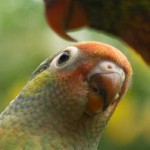Jon Ungoed-Thomas and Steven Swinford
The Sunday Times
October 30, 2005
CUSTOMS officers claim that the businessman at the centre of Britain’s first avian flu case made up to £4m from an alleged bird-smuggling operation.
Officers working under cover found that Brett Hammond secretly imported thousands of exotic birds using fake documents more than a decade ago, according to court records.
Despite the discovery of the illegal trade, Hammond was allowed to continue to run one of Britain’s 83 quarantine centres, which are a key defence against an avian flu pandemic.
Hammond was prosecuted for Vat evasion and jailed for a year. He denies smuggling, but his accountant said last week that Hammond accepts that some of the birds were not quarantined.
The disclosure that Hammond flouted a scheme for which he is now responsible is an embarrassment for Margaret Beckett, the environment secretary, who has been accused of overseeing a “shambolic” quarantine system.
Last night Beckett was under further pressure as new documents showed that the UK had rejected a proposed ban on commercial wild bird imports to protect against avian flu six months ago. She had insisted in the House of Commons last week that the proposal had nothing to do with protecting the country from avian flu.
Britain’s first case of the H5N1 strain of avian flu, which has killed at least 60 people in Asia, was confirmed eight days ago after the death of an orange-winged Amazon parrot at the quarantine centre operated by Hammond’s company, Pegasus Birds.
The centre consists of a group of ramshackle sheds in the garden of a semi-detached house in South Fambridge, Essex. It has emerged that 32 other birds had died there before the parrot and that some of those were also infected with avian flu.
Checks are still being carried out on other batches of birds previously imported by Hammond. Ministers hope no infected birds were sold to the public.
Cursory checks on Hammond would have revealed the authorities’ extensive files on his activities. In the early 1990s he was under surveillance on suspicion of selling wild birds without putting them in quarantine and for failing to declare the imports to customs.
Court documents state: “The investigation involved the alleged large-scale smuggling of exotic birds into the United Kingdom. The birds would be purchased from various dealers (in Europe) and be transferred to a hired van. The birds would then be concealed to avoid detection.”
Prosecution lawyers alleged that Hammond and an associate were involved in the smuggling operation. The drivers transporting the live cargoes were given official documentation – including false invoices – permitting importation.
On most occasions, however, they were not challenged and the birds entered the country illegally and without going into quarantine, according to customs documents held by the court.
Between January 1993 and May 1995, officers identified 165 trips involving Hammond and his associate. On some, they followed vehicles suspected of carrying boxes of birds from Belgium and Holland. “These vehicles were followed from Dover on a number of occasions and each time the deliveries were made to the premises of Pegasus Birds Ltd.”
Hammond was jailed for 18 months at Knightsbridge Crown Court in London in February 1997 after admitting a specimen charge of evading up to £50,000 Vat. This was reduced to 12 months on appeal.







